Accounting Theories and Tax Levies
VerifiedAdded on 2020/02/24
|9
|2246
|210
AI Summary
This assignment delves into the effects of government taxation on banking institutions by examining different accounting theories. It particularly emphasizes the role of descriptive theory in predicting how banks will react to these tax changes, analyzing their short-term and long-term responses. The assignment encourages students to consider the practical implications of various accounting perspectives within the context of fiscal policy.
Contribute Materials
Your contribution can guide someone’s learning journey. Share your
documents today.
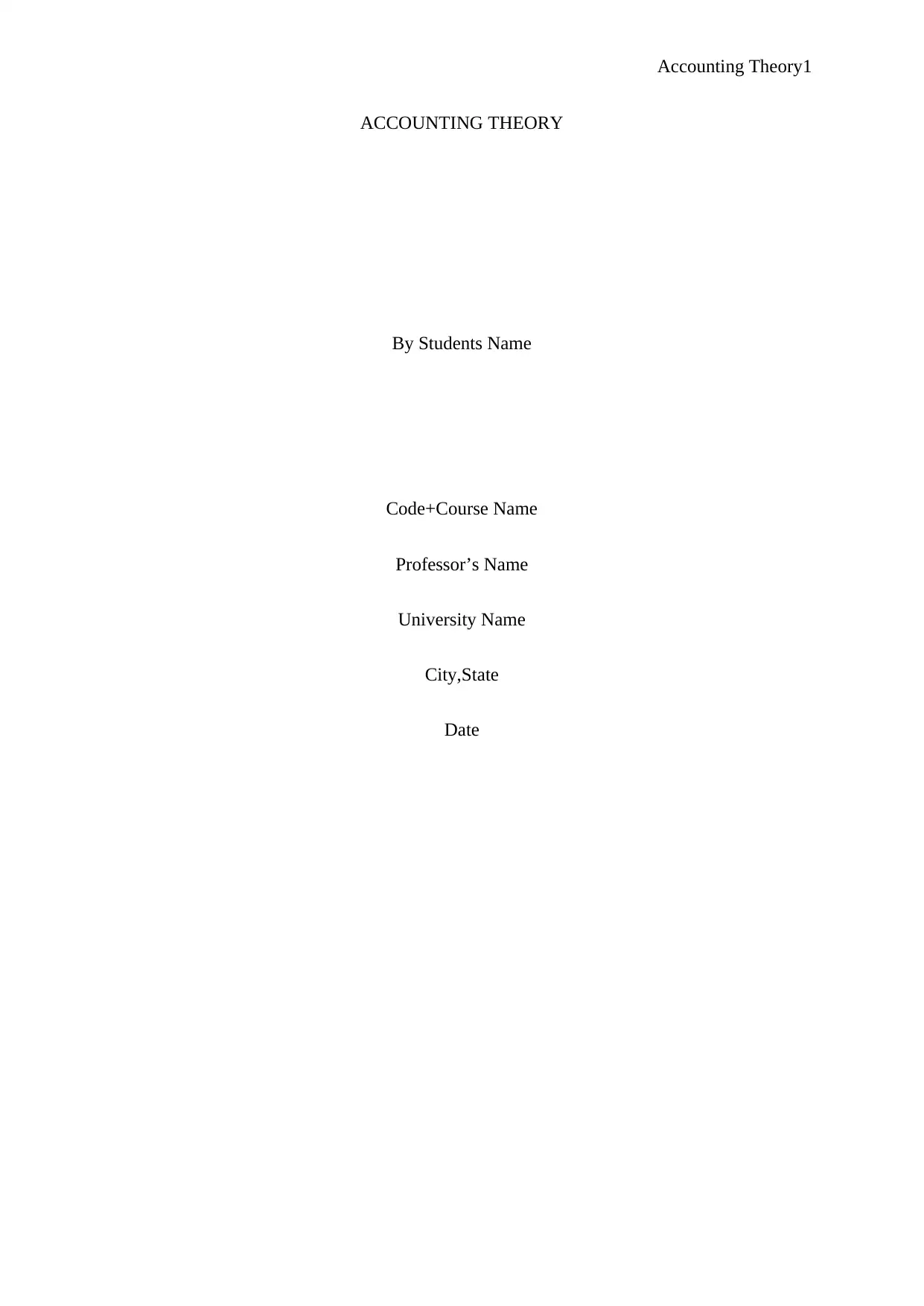
Accounting Theory1
ACCOUNTING THEORY
By Students Name
Code+Course Name
Professor’s Name
University Name
City,State
Date
ACCOUNTING THEORY
By Students Name
Code+Course Name
Professor’s Name
University Name
City,State
Date
Secure Best Marks with AI Grader
Need help grading? Try our AI Grader for instant feedback on your assignments.
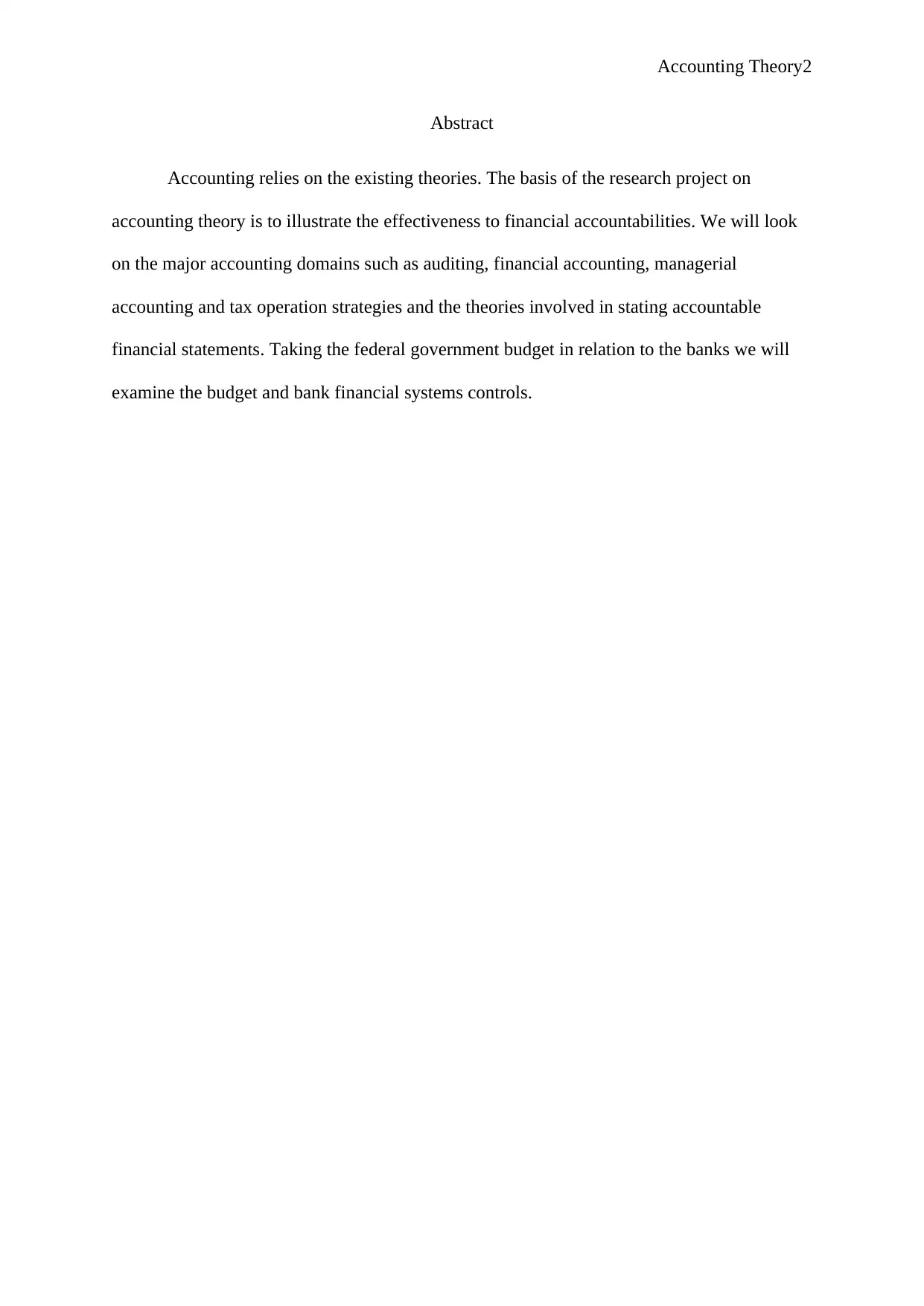
Accounting Theory2
Abstract
Accounting relies on the existing theories. The basis of the research project on
accounting theory is to illustrate the effectiveness to financial accountabilities. We will look
on the major accounting domains such as auditing, financial accounting, managerial
accounting and tax operation strategies and the theories involved in stating accountable
financial statements. Taking the federal government budget in relation to the banks we will
examine the budget and bank financial systems controls.
Abstract
Accounting relies on the existing theories. The basis of the research project on
accounting theory is to illustrate the effectiveness to financial accountabilities. We will look
on the major accounting domains such as auditing, financial accounting, managerial
accounting and tax operation strategies and the theories involved in stating accountable
financial statements. Taking the federal government budget in relation to the banks we will
examine the budget and bank financial systems controls.
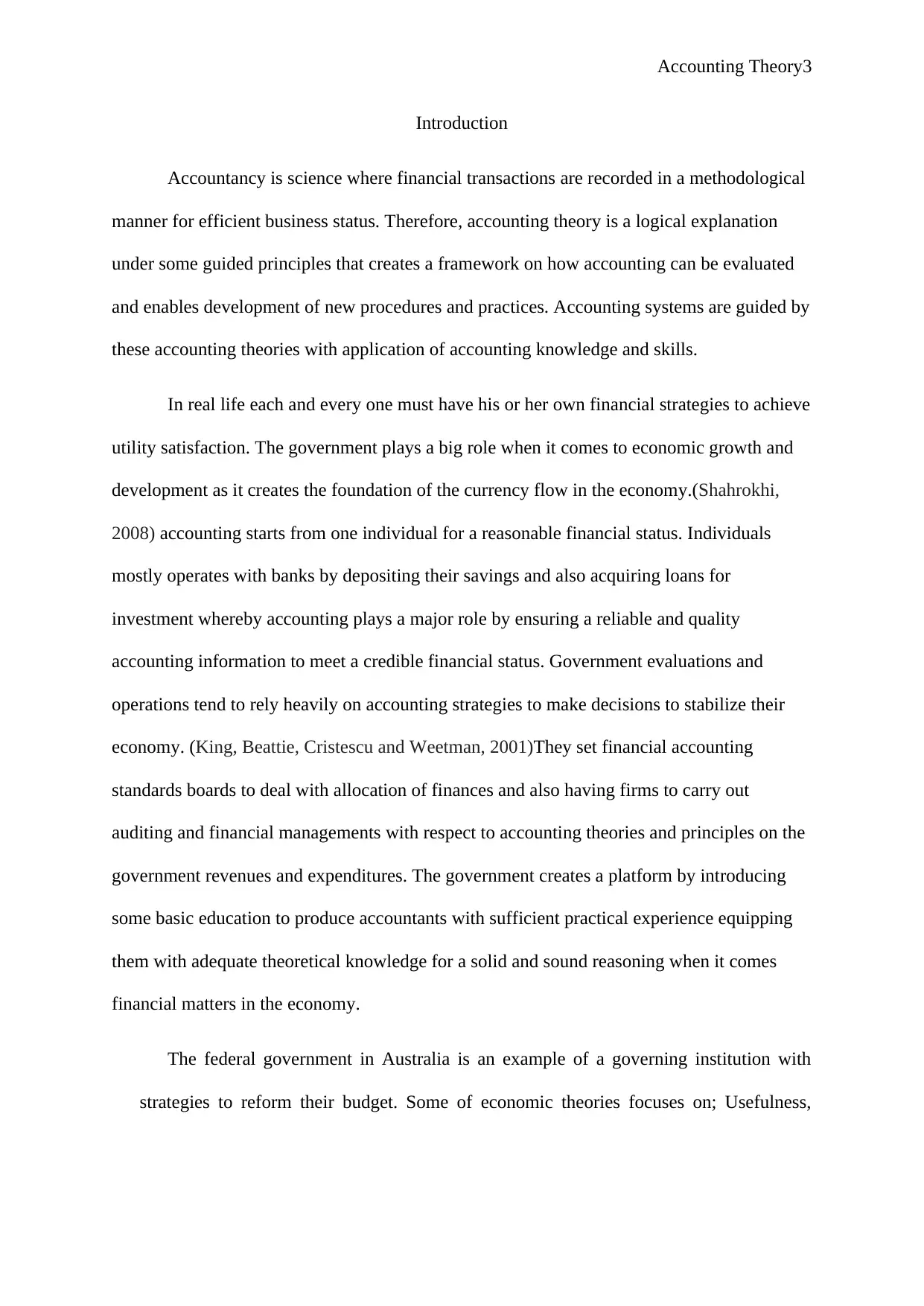
Accounting Theory3
Introduction
Accountancy is science where financial transactions are recorded in a methodological
manner for efficient business status. Therefore, accounting theory is a logical explanation
under some guided principles that creates a framework on how accounting can be evaluated
and enables development of new procedures and practices. Accounting systems are guided by
these accounting theories with application of accounting knowledge and skills.
In real life each and every one must have his or her own financial strategies to achieve
utility satisfaction. The government plays a big role when it comes to economic growth and
development as it creates the foundation of the currency flow in the economy.(Shahrokhi,
2008) accounting starts from one individual for a reasonable financial status. Individuals
mostly operates with banks by depositing their savings and also acquiring loans for
investment whereby accounting plays a major role by ensuring a reliable and quality
accounting information to meet a credible financial status. Government evaluations and
operations tend to rely heavily on accounting strategies to make decisions to stabilize their
economy. (King, Beattie, Cristescu and Weetman, 2001)They set financial accounting
standards boards to deal with allocation of finances and also having firms to carry out
auditing and financial managements with respect to accounting theories and principles on the
government revenues and expenditures. The government creates a platform by introducing
some basic education to produce accountants with sufficient practical experience equipping
them with adequate theoretical knowledge for a solid and sound reasoning when it comes
financial matters in the economy.
The federal government in Australia is an example of a governing institution with
strategies to reform their budget. Some of economic theories focuses on; Usefulness,
Introduction
Accountancy is science where financial transactions are recorded in a methodological
manner for efficient business status. Therefore, accounting theory is a logical explanation
under some guided principles that creates a framework on how accounting can be evaluated
and enables development of new procedures and practices. Accounting systems are guided by
these accounting theories with application of accounting knowledge and skills.
In real life each and every one must have his or her own financial strategies to achieve
utility satisfaction. The government plays a big role when it comes to economic growth and
development as it creates the foundation of the currency flow in the economy.(Shahrokhi,
2008) accounting starts from one individual for a reasonable financial status. Individuals
mostly operates with banks by depositing their savings and also acquiring loans for
investment whereby accounting plays a major role by ensuring a reliable and quality
accounting information to meet a credible financial status. Government evaluations and
operations tend to rely heavily on accounting strategies to make decisions to stabilize their
economy. (King, Beattie, Cristescu and Weetman, 2001)They set financial accounting
standards boards to deal with allocation of finances and also having firms to carry out
auditing and financial managements with respect to accounting theories and principles on the
government revenues and expenditures. The government creates a platform by introducing
some basic education to produce accountants with sufficient practical experience equipping
them with adequate theoretical knowledge for a solid and sound reasoning when it comes
financial matters in the economy.
The federal government in Australia is an example of a governing institution with
strategies to reform their budget. Some of economic theories focuses on; Usefulness,
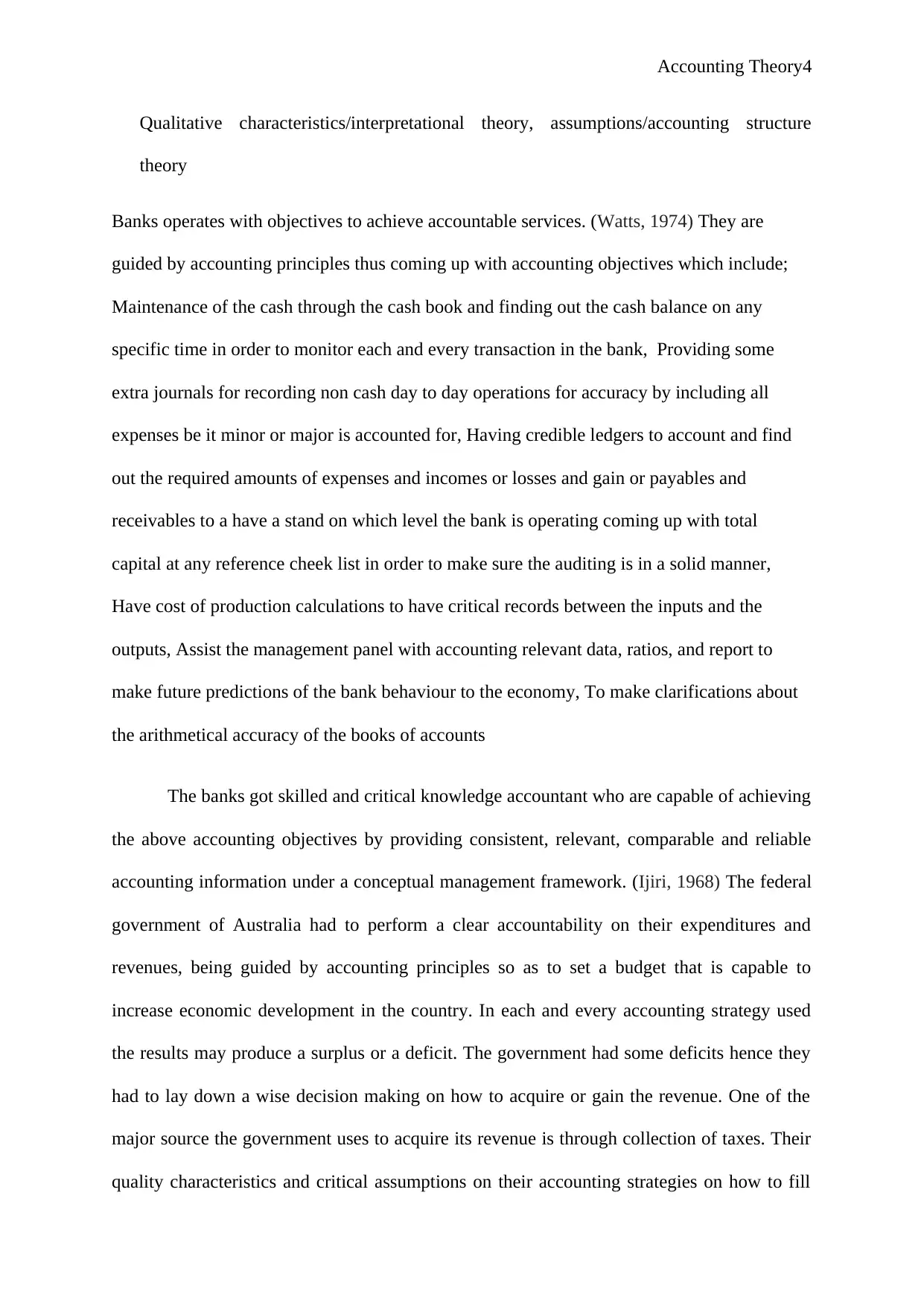
Accounting Theory4
Qualitative characteristics/interpretational theory, assumptions/accounting structure
theory
Banks operates with objectives to achieve accountable services. (Watts, 1974) They are
guided by accounting principles thus coming up with accounting objectives which include;
Maintenance of the cash through the cash book and finding out the cash balance on any
specific time in order to monitor each and every transaction in the bank, Providing some
extra journals for recording non cash day to day operations for accuracy by including all
expenses be it minor or major is accounted for, Having credible ledgers to account and find
out the required amounts of expenses and incomes or losses and gain or payables and
receivables to a have a stand on which level the bank is operating coming up with total
capital at any reference cheek list in order to make sure the auditing is in a solid manner,
Have cost of production calculations to have critical records between the inputs and the
outputs, Assist the management panel with accounting relevant data, ratios, and report to
make future predictions of the bank behaviour to the economy, To make clarifications about
the arithmetical accuracy of the books of accounts
The banks got skilled and critical knowledge accountant who are capable of achieving
the above accounting objectives by providing consistent, relevant, comparable and reliable
accounting information under a conceptual management framework. (Ijiri, 1968) The federal
government of Australia had to perform a clear accountability on their expenditures and
revenues, being guided by accounting principles so as to set a budget that is capable to
increase economic development in the country. In each and every accounting strategy used
the results may produce a surplus or a deficit. The government had some deficits hence they
had to lay down a wise decision making on how to acquire or gain the revenue. One of the
major source the government uses to acquire its revenue is through collection of taxes. Their
quality characteristics and critical assumptions on their accounting strategies on how to fill
Qualitative characteristics/interpretational theory, assumptions/accounting structure
theory
Banks operates with objectives to achieve accountable services. (Watts, 1974) They are
guided by accounting principles thus coming up with accounting objectives which include;
Maintenance of the cash through the cash book and finding out the cash balance on any
specific time in order to monitor each and every transaction in the bank, Providing some
extra journals for recording non cash day to day operations for accuracy by including all
expenses be it minor or major is accounted for, Having credible ledgers to account and find
out the required amounts of expenses and incomes or losses and gain or payables and
receivables to a have a stand on which level the bank is operating coming up with total
capital at any reference cheek list in order to make sure the auditing is in a solid manner,
Have cost of production calculations to have critical records between the inputs and the
outputs, Assist the management panel with accounting relevant data, ratios, and report to
make future predictions of the bank behaviour to the economy, To make clarifications about
the arithmetical accuracy of the books of accounts
The banks got skilled and critical knowledge accountant who are capable of achieving
the above accounting objectives by providing consistent, relevant, comparable and reliable
accounting information under a conceptual management framework. (Ijiri, 1968) The federal
government of Australia had to perform a clear accountability on their expenditures and
revenues, being guided by accounting principles so as to set a budget that is capable to
increase economic development in the country. In each and every accounting strategy used
the results may produce a surplus or a deficit. The government had some deficits hence they
had to lay down a wise decision making on how to acquire or gain the revenue. One of the
major source the government uses to acquire its revenue is through collection of taxes. Their
quality characteristics and critical assumptions on their accounting strategies on how to fill
Secure Best Marks with AI Grader
Need help grading? Try our AI Grader for instant feedback on your assignments.
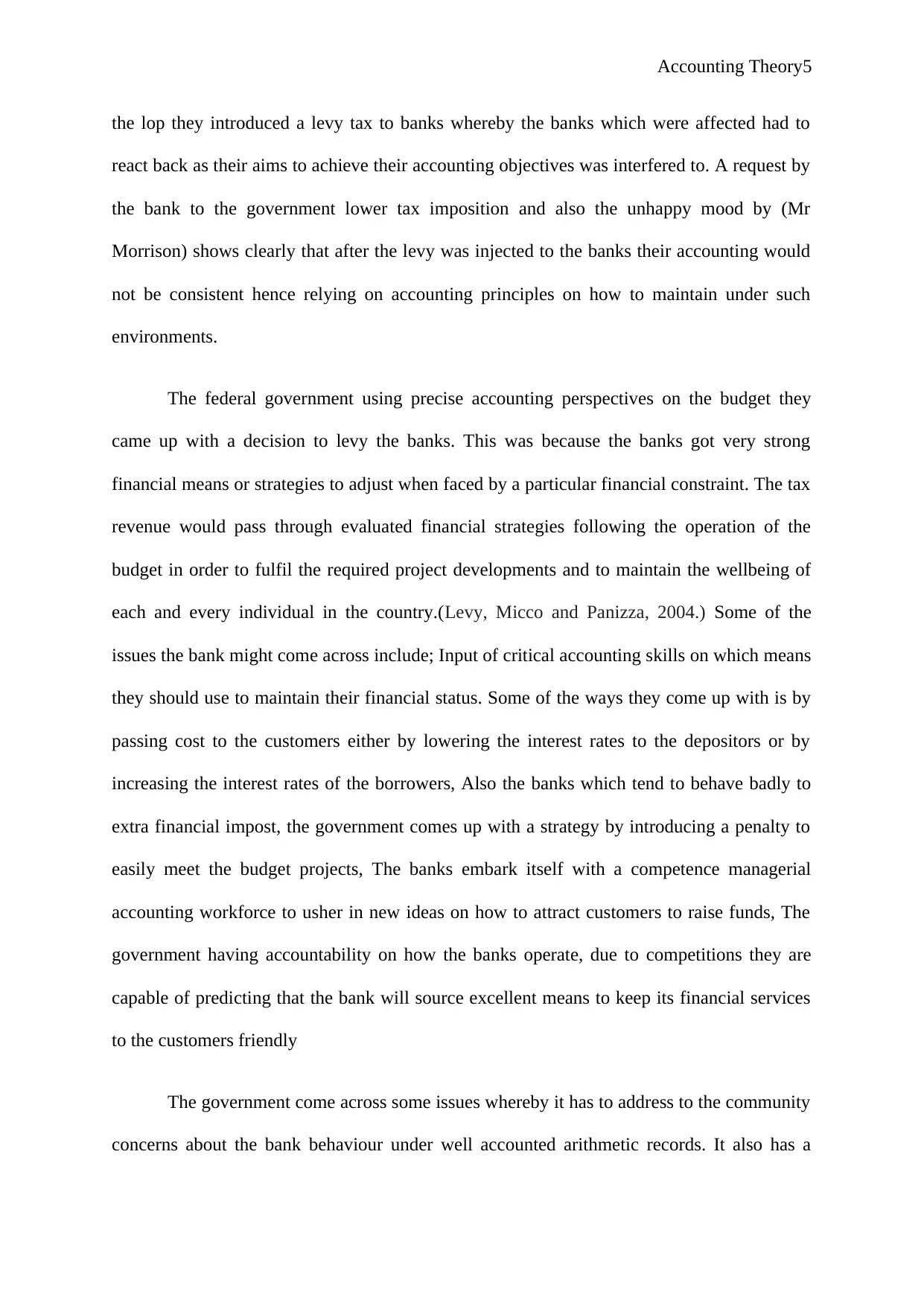
Accounting Theory5
the lop they introduced a levy tax to banks whereby the banks which were affected had to
react back as their aims to achieve their accounting objectives was interfered to. A request by
the bank to the government lower tax imposition and also the unhappy mood by (Mr
Morrison) shows clearly that after the levy was injected to the banks their accounting would
not be consistent hence relying on accounting principles on how to maintain under such
environments.
The federal government using precise accounting perspectives on the budget they
came up with a decision to levy the banks. This was because the banks got very strong
financial means or strategies to adjust when faced by a particular financial constraint. The tax
revenue would pass through evaluated financial strategies following the operation of the
budget in order to fulfil the required project developments and to maintain the wellbeing of
each and every individual in the country.(Levy, Micco and Panizza, 2004.) Some of the
issues the bank might come across include; Input of critical accounting skills on which means
they should use to maintain their financial status. Some of the ways they come up with is by
passing cost to the customers either by lowering the interest rates to the depositors or by
increasing the interest rates of the borrowers, Also the banks which tend to behave badly to
extra financial impost, the government comes up with a strategy by introducing a penalty to
easily meet the budget projects, The banks embark itself with a competence managerial
accounting workforce to usher in new ideas on how to attract customers to raise funds, The
government having accountability on how the banks operate, due to competitions they are
capable of predicting that the bank will source excellent means to keep its financial services
to the customers friendly
The government come across some issues whereby it has to address to the community
concerns about the bank behaviour under well accounted arithmetic records. It also has a
the lop they introduced a levy tax to banks whereby the banks which were affected had to
react back as their aims to achieve their accounting objectives was interfered to. A request by
the bank to the government lower tax imposition and also the unhappy mood by (Mr
Morrison) shows clearly that after the levy was injected to the banks their accounting would
not be consistent hence relying on accounting principles on how to maintain under such
environments.
The federal government using precise accounting perspectives on the budget they
came up with a decision to levy the banks. This was because the banks got very strong
financial means or strategies to adjust when faced by a particular financial constraint. The tax
revenue would pass through evaluated financial strategies following the operation of the
budget in order to fulfil the required project developments and to maintain the wellbeing of
each and every individual in the country.(Levy, Micco and Panizza, 2004.) Some of the
issues the bank might come across include; Input of critical accounting skills on which means
they should use to maintain their financial status. Some of the ways they come up with is by
passing cost to the customers either by lowering the interest rates to the depositors or by
increasing the interest rates of the borrowers, Also the banks which tend to behave badly to
extra financial impost, the government comes up with a strategy by introducing a penalty to
easily meet the budget projects, The banks embark itself with a competence managerial
accounting workforce to usher in new ideas on how to attract customers to raise funds, The
government having accountability on how the banks operate, due to competitions they are
capable of predicting that the bank will source excellent means to keep its financial services
to the customers friendly
The government come across some issues whereby it has to address to the community
concerns about the bank behaviour under well accounted arithmetic records. It also has a
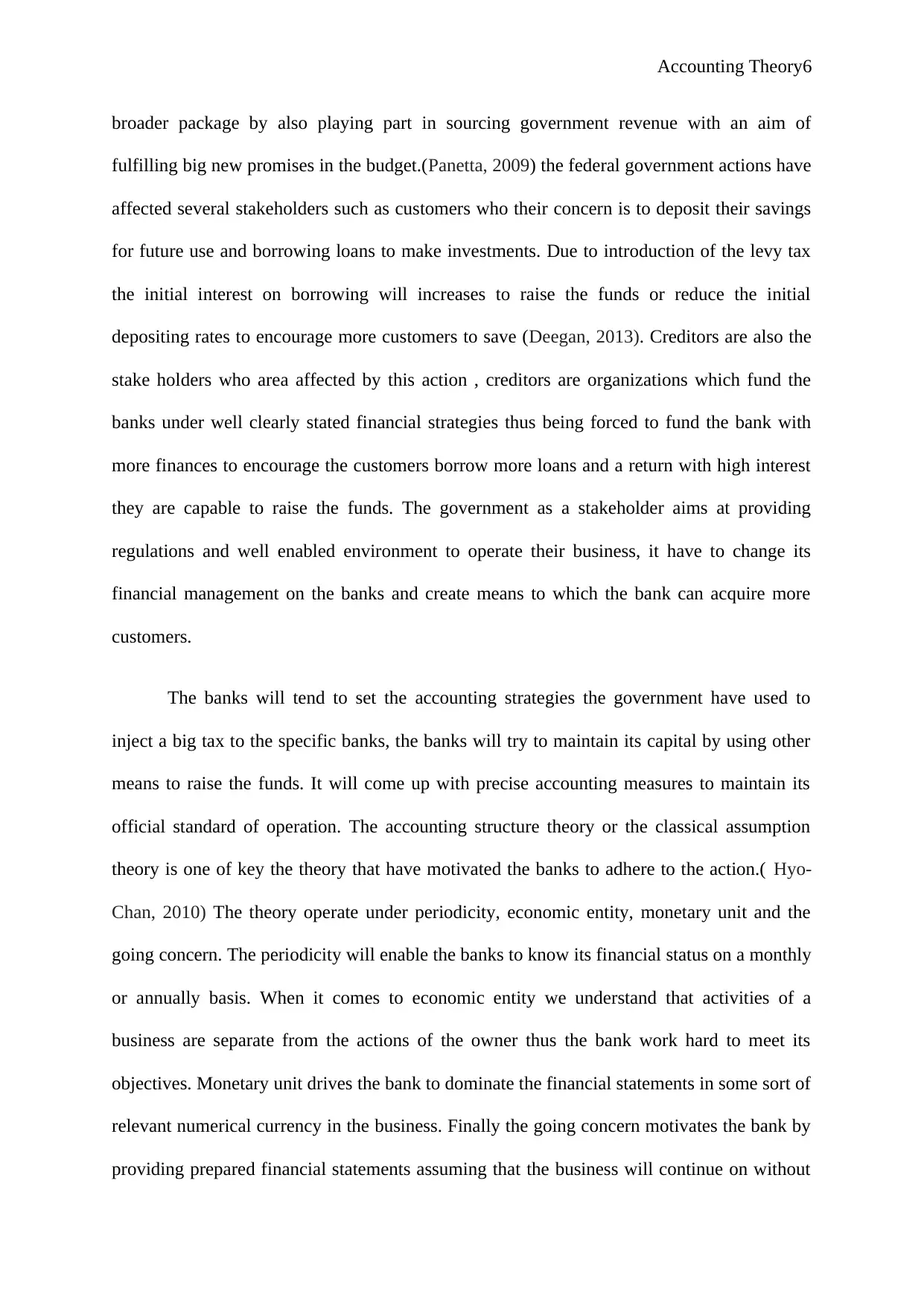
Accounting Theory6
broader package by also playing part in sourcing government revenue with an aim of
fulfilling big new promises in the budget.(Panetta, 2009) the federal government actions have
affected several stakeholders such as customers who their concern is to deposit their savings
for future use and borrowing loans to make investments. Due to introduction of the levy tax
the initial interest on borrowing will increases to raise the funds or reduce the initial
depositing rates to encourage more customers to save (Deegan, 2013). Creditors are also the
stake holders who area affected by this action , creditors are organizations which fund the
banks under well clearly stated financial strategies thus being forced to fund the bank with
more finances to encourage the customers borrow more loans and a return with high interest
they are capable to raise the funds. The government as a stakeholder aims at providing
regulations and well enabled environment to operate their business, it have to change its
financial management on the banks and create means to which the bank can acquire more
customers.
The banks will tend to set the accounting strategies the government have used to
inject a big tax to the specific banks, the banks will try to maintain its capital by using other
means to raise the funds. It will come up with precise accounting measures to maintain its
official standard of operation. The accounting structure theory or the classical assumption
theory is one of key the theory that have motivated the banks to adhere to the action.( Hyo-
Chan, 2010) The theory operate under periodicity, economic entity, monetary unit and the
going concern. The periodicity will enable the banks to know its financial status on a monthly
or annually basis. When it comes to economic entity we understand that activities of a
business are separate from the actions of the owner thus the bank work hard to meet its
objectives. Monetary unit drives the bank to dominate the financial statements in some sort of
relevant numerical currency in the business. Finally the going concern motivates the bank by
providing prepared financial statements assuming that the business will continue on without
broader package by also playing part in sourcing government revenue with an aim of
fulfilling big new promises in the budget.(Panetta, 2009) the federal government actions have
affected several stakeholders such as customers who their concern is to deposit their savings
for future use and borrowing loans to make investments. Due to introduction of the levy tax
the initial interest on borrowing will increases to raise the funds or reduce the initial
depositing rates to encourage more customers to save (Deegan, 2013). Creditors are also the
stake holders who area affected by this action , creditors are organizations which fund the
banks under well clearly stated financial strategies thus being forced to fund the bank with
more finances to encourage the customers borrow more loans and a return with high interest
they are capable to raise the funds. The government as a stakeholder aims at providing
regulations and well enabled environment to operate their business, it have to change its
financial management on the banks and create means to which the bank can acquire more
customers.
The banks will tend to set the accounting strategies the government have used to
inject a big tax to the specific banks, the banks will try to maintain its capital by using other
means to raise the funds. It will come up with precise accounting measures to maintain its
official standard of operation. The accounting structure theory or the classical assumption
theory is one of key the theory that have motivated the banks to adhere to the action.( Hyo-
Chan, 2010) The theory operate under periodicity, economic entity, monetary unit and the
going concern. The periodicity will enable the banks to know its financial status on a monthly
or annually basis. When it comes to economic entity we understand that activities of a
business are separate from the actions of the owner thus the bank work hard to meet its
objectives. Monetary unit drives the bank to dominate the financial statements in some sort of
relevant numerical currency in the business. Finally the going concern motivates the bank by
providing prepared financial statements assuming that the business will continue on without
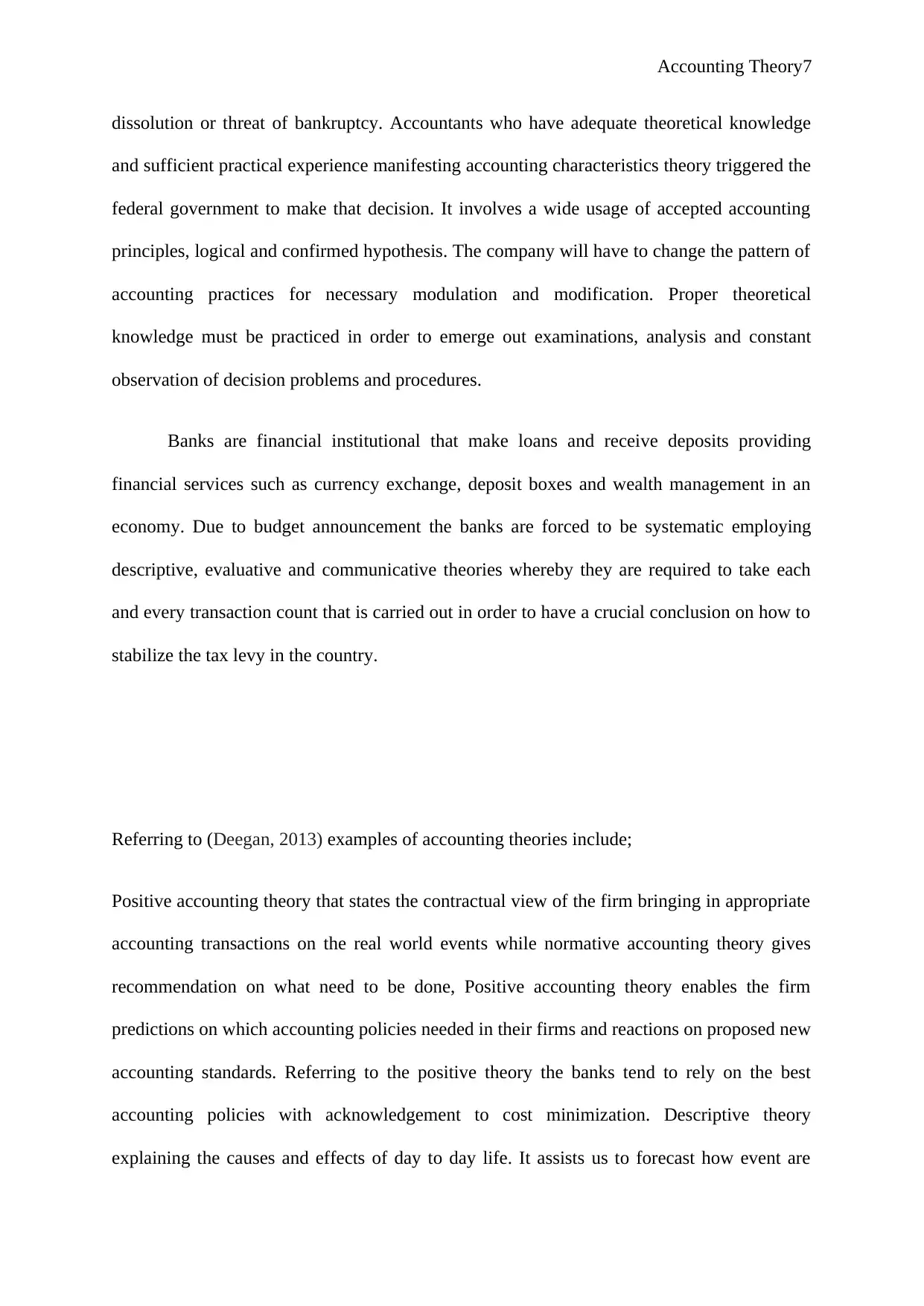
Accounting Theory7
dissolution or threat of bankruptcy. Accountants who have adequate theoretical knowledge
and sufficient practical experience manifesting accounting characteristics theory triggered the
federal government to make that decision. It involves a wide usage of accepted accounting
principles, logical and confirmed hypothesis. The company will have to change the pattern of
accounting practices for necessary modulation and modification. Proper theoretical
knowledge must be practiced in order to emerge out examinations, analysis and constant
observation of decision problems and procedures.
Banks are financial institutional that make loans and receive deposits providing
financial services such as currency exchange, deposit boxes and wealth management in an
economy. Due to budget announcement the banks are forced to be systematic employing
descriptive, evaluative and communicative theories whereby they are required to take each
and every transaction count that is carried out in order to have a crucial conclusion on how to
stabilize the tax levy in the country.
Referring to (Deegan, 2013) examples of accounting theories include;
Positive accounting theory that states the contractual view of the firm bringing in appropriate
accounting transactions on the real world events while normative accounting theory gives
recommendation on what need to be done, Positive accounting theory enables the firm
predictions on which accounting policies needed in their firms and reactions on proposed new
accounting standards. Referring to the positive theory the banks tend to rely on the best
accounting policies with acknowledgement to cost minimization. Descriptive theory
explaining the causes and effects of day to day life. It assists us to forecast how event are
dissolution or threat of bankruptcy. Accountants who have adequate theoretical knowledge
and sufficient practical experience manifesting accounting characteristics theory triggered the
federal government to make that decision. It involves a wide usage of accepted accounting
principles, logical and confirmed hypothesis. The company will have to change the pattern of
accounting practices for necessary modulation and modification. Proper theoretical
knowledge must be practiced in order to emerge out examinations, analysis and constant
observation of decision problems and procedures.
Banks are financial institutional that make loans and receive deposits providing
financial services such as currency exchange, deposit boxes and wealth management in an
economy. Due to budget announcement the banks are forced to be systematic employing
descriptive, evaluative and communicative theories whereby they are required to take each
and every transaction count that is carried out in order to have a crucial conclusion on how to
stabilize the tax levy in the country.
Referring to (Deegan, 2013) examples of accounting theories include;
Positive accounting theory that states the contractual view of the firm bringing in appropriate
accounting transactions on the real world events while normative accounting theory gives
recommendation on what need to be done, Positive accounting theory enables the firm
predictions on which accounting policies needed in their firms and reactions on proposed new
accounting standards. Referring to the positive theory the banks tend to rely on the best
accounting policies with acknowledgement to cost minimization. Descriptive theory
explaining the causes and effects of day to day life. It assists us to forecast how event are
Paraphrase This Document
Need a fresh take? Get an instant paraphrase of this document with our AI Paraphraser
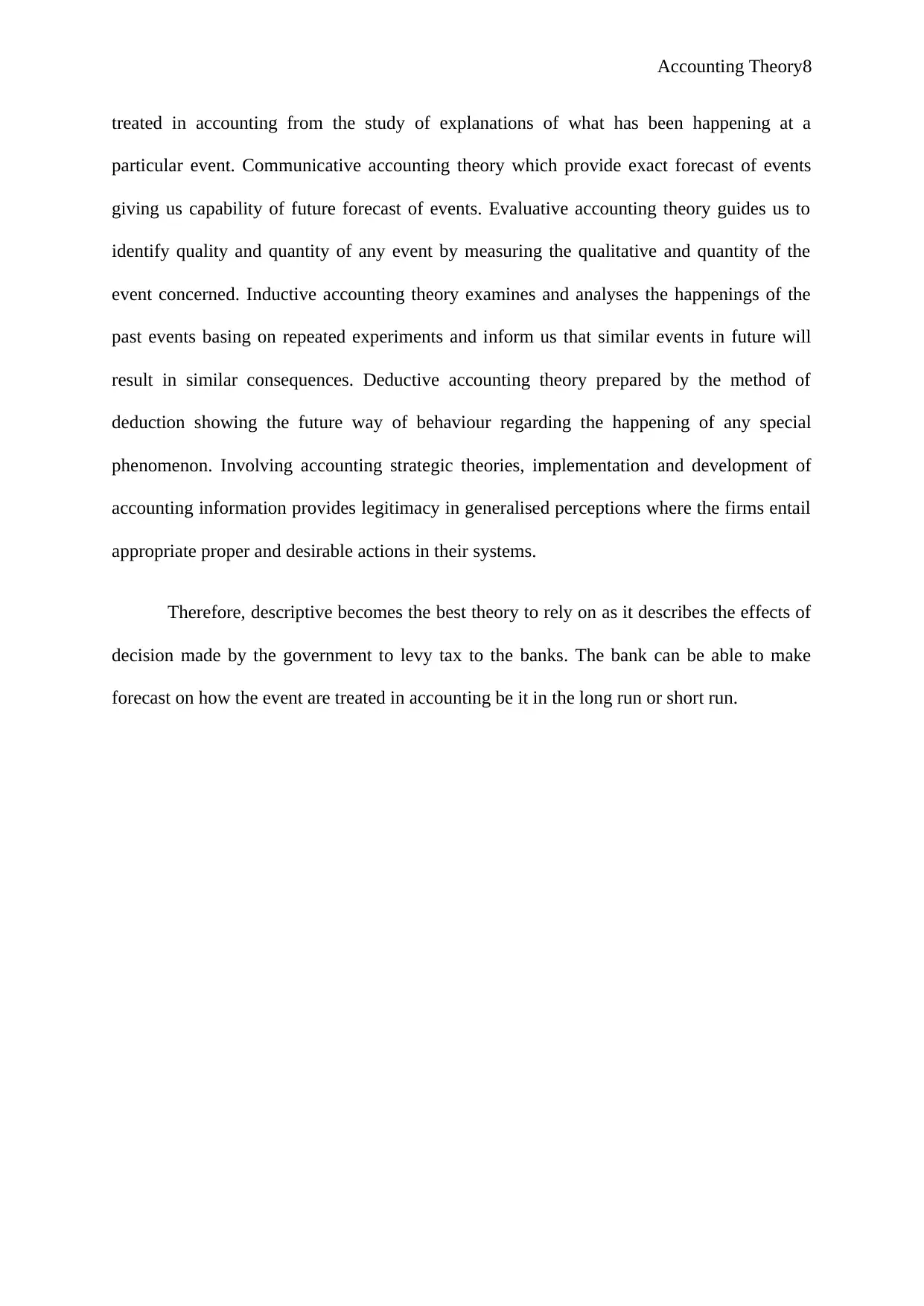
Accounting Theory8
treated in accounting from the study of explanations of what has been happening at a
particular event. Communicative accounting theory which provide exact forecast of events
giving us capability of future forecast of events. Evaluative accounting theory guides us to
identify quality and quantity of any event by measuring the qualitative and quantity of the
event concerned. Inductive accounting theory examines and analyses the happenings of the
past events basing on repeated experiments and inform us that similar events in future will
result in similar consequences. Deductive accounting theory prepared by the method of
deduction showing the future way of behaviour regarding the happening of any special
phenomenon. Involving accounting strategic theories, implementation and development of
accounting information provides legitimacy in generalised perceptions where the firms entail
appropriate proper and desirable actions in their systems.
Therefore, descriptive becomes the best theory to rely on as it describes the effects of
decision made by the government to levy tax to the banks. The bank can be able to make
forecast on how the event are treated in accounting be it in the long run or short run.
treated in accounting from the study of explanations of what has been happening at a
particular event. Communicative accounting theory which provide exact forecast of events
giving us capability of future forecast of events. Evaluative accounting theory guides us to
identify quality and quantity of any event by measuring the qualitative and quantity of the
event concerned. Inductive accounting theory examines and analyses the happenings of the
past events basing on repeated experiments and inform us that similar events in future will
result in similar consequences. Deductive accounting theory prepared by the method of
deduction showing the future way of behaviour regarding the happening of any special
phenomenon. Involving accounting strategic theories, implementation and development of
accounting information provides legitimacy in generalised perceptions where the firms entail
appropriate proper and desirable actions in their systems.
Therefore, descriptive becomes the best theory to rely on as it describes the effects of
decision made by the government to levy tax to the banks. The bank can be able to make
forecast on how the event are treated in accounting be it in the long run or short run.
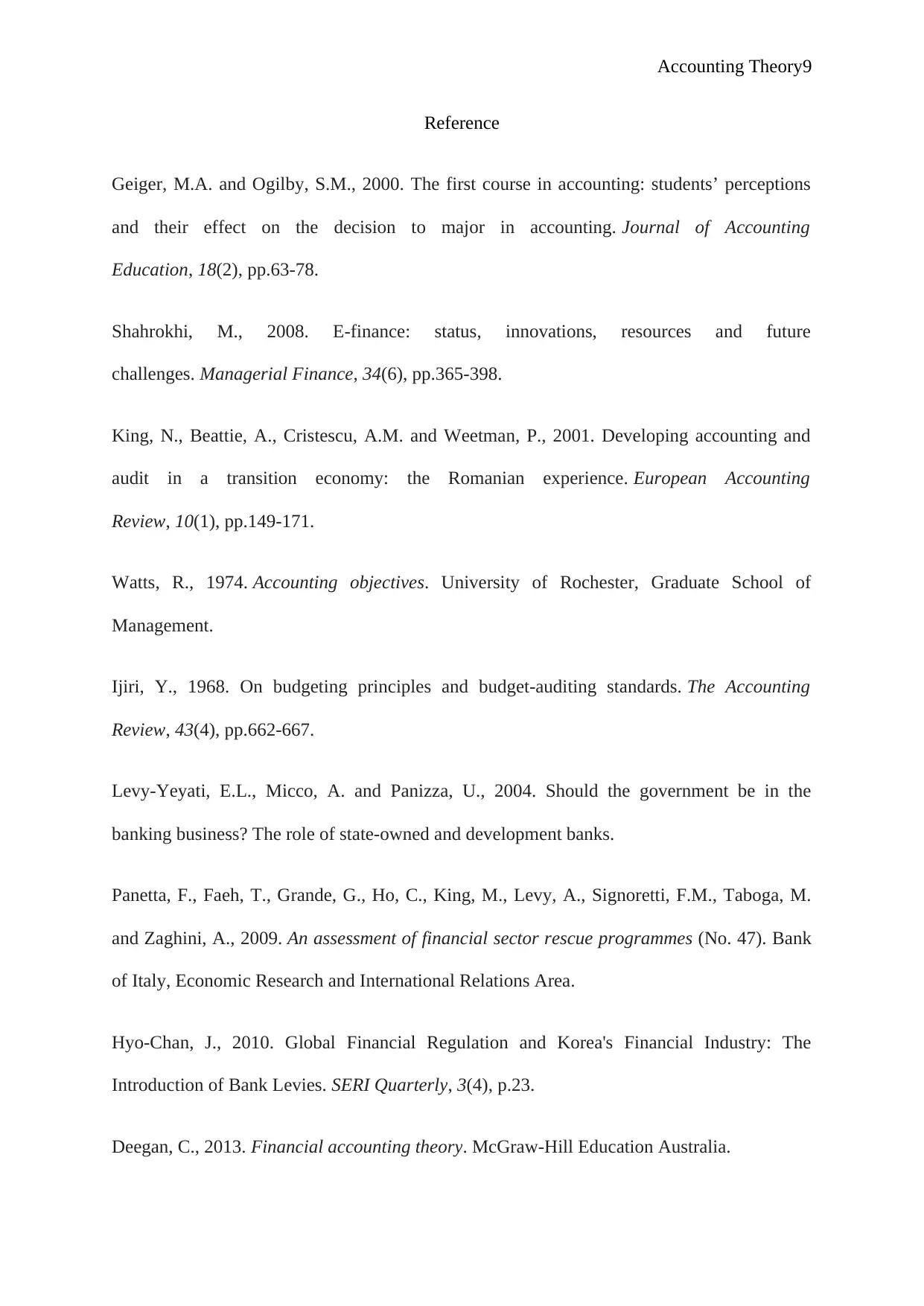
Accounting Theory9
Reference
Geiger, M.A. and Ogilby, S.M., 2000. The first course in accounting: students’ perceptions
and their effect on the decision to major in accounting. Journal of Accounting
Education, 18(2), pp.63-78.
Shahrokhi, M., 2008. E-finance: status, innovations, resources and future
challenges. Managerial Finance, 34(6), pp.365-398.
King, N., Beattie, A., Cristescu, A.M. and Weetman, P., 2001. Developing accounting and
audit in a transition economy: the Romanian experience. European Accounting
Review, 10(1), pp.149-171.
Watts, R., 1974. Accounting objectives. University of Rochester, Graduate School of
Management.
Ijiri, Y., 1968. On budgeting principles and budget-auditing standards. The Accounting
Review, 43(4), pp.662-667.
Levy-Yeyati, E.L., Micco, A. and Panizza, U., 2004. Should the government be in the
banking business? The role of state-owned and development banks.
Panetta, F., Faeh, T., Grande, G., Ho, C., King, M., Levy, A., Signoretti, F.M., Taboga, M.
and Zaghini, A., 2009. An assessment of financial sector rescue programmes (No. 47). Bank
of Italy, Economic Research and International Relations Area.
Hyo-Chan, J., 2010. Global Financial Regulation and Korea's Financial Industry: The
Introduction of Bank Levies. SERI Quarterly, 3(4), p.23.
Deegan, C., 2013. Financial accounting theory. McGraw-Hill Education Australia.
Reference
Geiger, M.A. and Ogilby, S.M., 2000. The first course in accounting: students’ perceptions
and their effect on the decision to major in accounting. Journal of Accounting
Education, 18(2), pp.63-78.
Shahrokhi, M., 2008. E-finance: status, innovations, resources and future
challenges. Managerial Finance, 34(6), pp.365-398.
King, N., Beattie, A., Cristescu, A.M. and Weetman, P., 2001. Developing accounting and
audit in a transition economy: the Romanian experience. European Accounting
Review, 10(1), pp.149-171.
Watts, R., 1974. Accounting objectives. University of Rochester, Graduate School of
Management.
Ijiri, Y., 1968. On budgeting principles and budget-auditing standards. The Accounting
Review, 43(4), pp.662-667.
Levy-Yeyati, E.L., Micco, A. and Panizza, U., 2004. Should the government be in the
banking business? The role of state-owned and development banks.
Panetta, F., Faeh, T., Grande, G., Ho, C., King, M., Levy, A., Signoretti, F.M., Taboga, M.
and Zaghini, A., 2009. An assessment of financial sector rescue programmes (No. 47). Bank
of Italy, Economic Research and International Relations Area.
Hyo-Chan, J., 2010. Global Financial Regulation and Korea's Financial Industry: The
Introduction of Bank Levies. SERI Quarterly, 3(4), p.23.
Deegan, C., 2013. Financial accounting theory. McGraw-Hill Education Australia.
1 out of 9
Related Documents
Your All-in-One AI-Powered Toolkit for Academic Success.
+13062052269
info@desklib.com
Available 24*7 on WhatsApp / Email
![[object Object]](/_next/static/media/star-bottom.7253800d.svg)
Unlock your academic potential
© 2024 | Zucol Services PVT LTD | All rights reserved.




